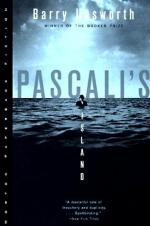
|
| Name: _________________________ | Period: ___________________ |
This test consists of 5 short answer questions, 10 short essay questions, and 1 (of 3) essay topics.
Short Answer Questions
1. What does Pascali realize that Bowles believes about himself?
2. To what does Pascali agree?
3. Who waits impatiently for all persons to arrive for the meeting?
4. What is the likely reason Bowles has suddenly brought up the presence of the soldiers?
5. How would this trait that Bowles sees in Pascali help Bowles?
Short Essay Questions
1. Explain how Pascali and Bowles agree again to be allies and whether you think either man is sincere.
2. What does Pascali seem to forget when he is rejoicing at the prospect of 150 liras?
3. How is the previous foreshadowing come to completion in this final section?
4. What evidence is there that Pascali may be in danger?
5. What do you think is one of the main purposes of this short chapter?
6. How does Pascali miss an important clue about Bowles because of Pascali's own desires?
7. What do you think is a possible instance of foreshadowing in this section?
8. By this section, can we be certain as to whether Pascali is a reliable narrator?
9. What is ironic as Pascali reflects on whether to send this latest report to the Sultan?
10. How is the slaughter of the sheep symbolic of a "slaughter" that takes place within Pascali?
Essay Topics
Write an essay for ONE of the following topics:
Essay Topic 1
Pascali seems convinced that his death (at the hands of an assassin) is imminent. Much of what he does is motivated from a sense of self-preservation. Answer the following questions and write a well-developed, cohesive essay using examples from the text and your research or personal experience:
1. Give the reasons Pascali thinks he has been found out to be a spy. Do they seem valid?
2. How does Pascali think he himself inadvertently "outed" himself as a spy? Give examples. Are the reasons he give ones that would make you suspect someone of being a spy?
3. After Pascali meets up with Politis in section 8, the exchange between the two of them changes Pascali's thoughts about whether the townspeople have figured out he is a spy. How does he change? Does this change seem logical and based on solid reasoning?
4. At the end of the book, Pascali is again waiting for his death, thinking that there are those who want to kill him. What seems to be the truth to you? Is Pascali in danger? Why or why not? Was he ever in danger throughout the entire book? Explain.
Essay Topic 2
The characters in Pascali's Island are the central focus of the novel; in other words, the characters drive the plot rather than the other way around as is the case in some novels. Choose one of the following questions and write a well-developed, cohesive essay using examples from the text and your research or personal experience:
1. Write an in-depth character analysis of Pascali. Include a physical description, personality traits, and what beliefs motivate him. What do you like and dislike about this character? Why? Give specific examples.
2. Write an in-depth character analysis of Bowles. Include a physical description, personality traits, and what beliefs motivate him. What do you like and dislike about this character? Why? Give specific examples.
3. Choose three other characters besides Pascali or Bowles and write about them in relationship to both Bowles and Pascali. Are they friendly or hostile to either main character? Explain with examples. What is their purpose(s) in the story?
Essay Topic 3
In section 7, as Pascali readies for the meeting with Pasha, he is again disturbed by Bowles' consistent maintenance of a sense of moral superiority. This statement could be considered ironic for several reasons. Answer the following questions and write a well-developed, cohesive essay using examples from the text and your research or personal experience:
1. How would you define the concept of irony?
2. Why could the statement above be considered ironic? Use examples and detail in your explanation.
3. Pascali has a number of thoughts or makes statements that are ironic, though he seldom realizes this fact. Go through the text and find several instances of ironic thoughts or statements from Pascali and explain the situation and why you believe it to be ironic.
|
This section contains 1,573 words (approx. 6 pages at 300 words per page) |

|




